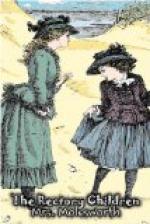She glanced round her as she spoke. It was a bare, almost desolate-looking stretch of country, down to the sea, which was still and gray-looking this morning. Yet there was a strange charm about it too—the land, though by no means hilly, was undulating. Not far from where the children stood there was a grand run of sand-hills, with coarse, strong grass and a few hardy thistles, and, in its season, bindweed with its white and pinky flowers, growing along their summit. Farther off was a sort of skeleton-like erection, looking not unlike the gaunt remains of a deserted sail-less ship: this was a landmark or beacon, placed there to point out a sudden turn in the coastline. And out at sea, a mile or so distant, stood a lighthouse with a revolving lantern; three times in each minute the bright light was to be seen as soon as night fell. A kind of natural breakwater ran out in a straight line to the lighthouse, so that in low tides—and the tides are sometimes very low at Seacove—it was difficult to believe but that you could get on foot all the way to the lighthouse rock.
But all these interesting particulars were not as yet known to Mr. Vane’s children. They had arrived at Seacove Rectory only the night before.
The boy—he was next in age to his elder sister Rosalys—followed the direction of her glance.
‘No,’ he said, ’there’s very few trees, certainly. But I think it’s going to be very jolly all the same. When I get my pony I’ll be all right any way; and on Saturdays, or odd half-holidays—there always are odd half-holidays at every school, you know—I’ll take you girls out a drive in that funny little donkey-chaise, or whatever it is, that’s standing in the coach-house.’
‘I don’t fancy there are many places to drive to,’ Rosalys replied. ’Papa said there would be no use in having any sort of proper carriage. The only good road is the one to your school, Rough, and you’ll have enough of that morning and evening.’
’Papa said Seacove was a—I can’t remember the word—something French—cool—cul——’
‘Cul-de-sac,’ said Rosalys; ‘leading to nowhere, that means.’
‘Except to the sea, I suppose,’ added the little girl who had stumbled at the French word. ’It would be nice to have a ship of our own instead of a carriage. Don’t you think we might ask papa to get us one?’
‘A ship, Biddy—I suppose you mean a boat,’ said Rosalys, in a rather ‘superior’ tone. ’No; I don’t fancy papa would trust us to go about in a boat. Mamma would be frightened out of her wits about us.’
‘The sea looks so quiet,’ said Bridget, gazing out at it. ’I don’t think it could ever be tossy and soapy here like it used to be at Rockcliffe.’
‘Couldn’t it just?’ said Randolph. ’Wait a bit, Bride. It may look quiet on a day like this, and inside the shelter of the bay, but I can tell you there’s jolly rough work outside there sometimes. I was talking to an old sailor this morning when I ran out before breakfast.’




